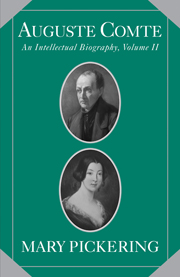Book contents
- Frontmatter
- Contents
- Acknowledgments
- Abbreviations and Notes
- Introduction
- 1 1843–1844: The Battle against the Pedantocracy
- 2 Tensions in Comte's Relationships, 1842–1846
- 3 Clotilde de Vaux and the Initial Encounter with Comte
- 4 The Muse's Tragic End
- 5 Pain and Recognition
- 6 The Revolution of 1848
- 7 Discours sur l'ensemble du positivisme
- 8 Personal and Professional Disappointments
- 9 The Early Development of the Religion of Humanity
- 10 The Development of the Positivist Movement
- Conclusion
- Bibliography
- Index
- References
10 - The Development of the Positivist Movement
Published online by Cambridge University Press: 06 January 2010
- Frontmatter
- Contents
- Acknowledgments
- Abbreviations and Notes
- Introduction
- 1 1843–1844: The Battle against the Pedantocracy
- 2 Tensions in Comte's Relationships, 1842–1846
- 3 Clotilde de Vaux and the Initial Encounter with Comte
- 4 The Muse's Tragic End
- 5 Pain and Recognition
- 6 The Revolution of 1848
- 7 Discours sur l'ensemble du positivisme
- 8 Personal and Professional Disappointments
- 9 The Early Development of the Religion of Humanity
- 10 The Development of the Positivist Movement
- Conclusion
- Bibliography
- Index
- References
Summary
Thus true union depends far more on the heart than on the mind.
Comte, “Deuxième Circulaire annuelle,” March 24, 1851POPULARITY OF POSITIVISM
Since the Revolution of 1848, Comte had pushed the Positivist Society to publish policy papers and to garner converts. He had also done much proselytizing, refining the religious contours of his doctrine and printing a chart of the brain, a calendar, and a positivist canon; he wished to express the gist of his ideas in a visible fashion to enable even those remotely curious to take them in at a glance. He seemed to understand that in the more urban, industrialized society, people were increasingly pressed for time and did not want to expend the effort to read tomes of philosophy such as the Cours. Aspiring to popularity and recognizing the force of public opinion in the new, more democratic age, Comte was influenced by both Girardin and Charpentier, who taught him the importance of reaching out to a mass audience with reading material presented in a simplified, compressed format. Yet, despite Comte's efforts, the positivist movement did not grow much. By November 1849, there were only thirty-five members in the Positivist Society; a year later there were forty-five. Comte's friend Claudel, who liked Joan of Arc, left for unknown reasons.
There was, however, one new member who pleased Comte: Joseph Lonchampt. Born in 1824, he had been one of Comte's students at the Ecole Polytechnique. After graduating, he became an artillery officer, farmer, and medical student.
- Type
- Chapter
- Information
- Auguste ComteAn Intellectual Biography, pp. 516 - 580Publisher: Cambridge University PressPrint publication year: 2009



